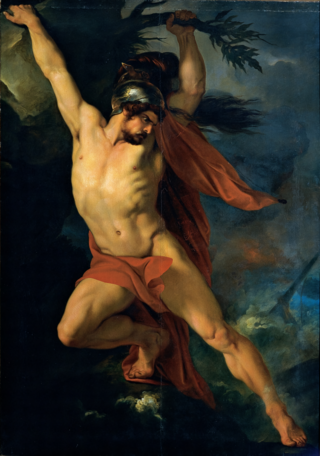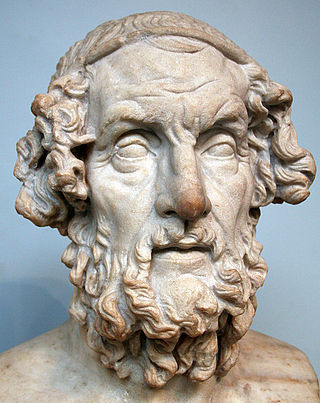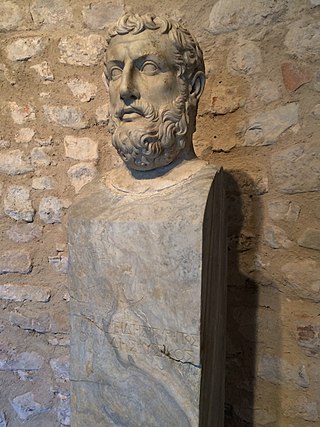Related Research Articles

Ajax was a Greek mythological hero, son of Oileus, the king of Locris. He was called the "Ajax the Less", the "lesser" or "Locrian" Ajax, to distinguish him from Ajax the Great, son of Telamon. He was the leader of the Locrian contingent during the Trojan War. He is a significant figure in Homer's Iliad and is also mentioned in the Odyssey, in Virgil's Aeneid and in Euripides' The Trojan Women. In Etruscan legend, he was known as Aivas Vilates.
In Greek mythology, Aeolus or Aiolos is a name shared by three mythical characters. These three personages are often difficult to tell apart, and even the ancient mythographers appear to have been perplexed about which Aeolus was which. Diodorus Siculus made an attempt to define each of these three, and his opinion is followed here.

Homer was an Ancient Greek poet who is credited as the author of the Iliad and the Odyssey, two epic poems that are foundational works of ancient Greek literature. Homer is considered one of the most revered and influential authors in history.

Plato was an ancient Greek philosopher of the Classical period who is considered a foundational thinker in Western philosophy and an innovator of the written dialogue and dialectic forms. He raised problems for what became all the major areas of both theoretical philosophy and practical philosophy, and was the founder of the Platonic Academy, a philosophical school in Athens where Plato taught the doctrines that would later become known as Platonism.

Parmenides of Elea was a pre-Socratic Greek philosopher from Elea in Magna Graecia.
In Greek mythology and history, there were at least eleven men named Medon.

In Greek mythology, dreams were sometimes personified as Oneiros or Oneiroi. In the Iliad of Homer, Zeus sends an Oneiros to appear to Agamemnon in a dream, while in Hesiod's Theogony, the Oneiroi are the sons of Nyx (Night), and brothers of Hypnos (Sleep).
Euryalus refers to the Euryalus fortress, the main citadel of Ancient Syracuse, and to several different characters from Greek mythology and classical literature:
Laodamas refers to five different people in Greek mythology.

The Platform Sutra of the Sixth Patriarch is a Chan Buddhist scripture that was composed in China during the 8th to 13th century. The "platform" (施法壇) refers to the podium on which a Buddhist teacher speaks. Its key themes are the direct perception of one's original nature, and the unity in essence of śīla (conduct), dhyāna (meditation) and prajñā (wisdom).
The name Eurymachus or Eurymachos is attributed to the following individuals:
Clytius, also spelled Klythios, Klytios, Clytios, and Klytius, is the name of multiple people in Greek mythology:
Achlys, in the Hesiodic Shield of Heracles, is one of the figures depicted on Heracles' shield, perhaps representing the personification of sorrow. In Homer, achlys is the mist which fogs or blinds mortal eyes. Her Roman counterpart Caligo was said to have been the mother of Chaos. In Nonnus's Dionysiaca, she seems to be a witch.
In Greek mythology, Thoas, a king of Aetolia, was the son of Andraemon and Gorge, and one of the heroes who fought for the Greeks in the Trojan War. Thoas had a son Haemon, and an unnamed daughter.
Perictione was the mother of the Greek philosopher Plato.
Translators and scholars have translated the main works attributed to Homer, the Iliad and Odyssey, from the Homeric Greek into English, since the 16th and 17th centuries. Translations are ordered chronologically by date of first publication, with first lines provided to illustrate the style of the translation.
In Greek mythology, the Hysminai or Hysminae are collectively the personification of combat. In Hesiod's Theogony, the Hysminai are listed among the children of Eris (Strife). Like all of the children of Eris given by Hesiod, the Hysminai are a personified abstraction, allegorizing the meaning of their name, and representing one of the many harmful things which might be thought to result from discord and strife, with no other identity.
The Enciclopedia Dantesca, published 1970–1975 by the Istituto dell'Enciclopedia Italiana, in six volumes, under the general editorship of Umberto Bosco, is considered the reference book in Italian language about the life and works of Dante, described as a "monumental" work
In Greek mythology, Electra was one of the 3,000 Oceanids, water-nymph daughters of the Titans Oceanus and his sister-spouse Tethys.
In Greek mythology, Eidothea or Idothea was the name of the following women:
References
- ↑ Kansas Zen Center
- ↑ Mendelsohn, Daniel (1997-07-20). "Yo, Achilles". New York Times . Retrieved 2009-02-16.
- ↑ Codrescu, Andrei (December 2006). "Driving over the wine-red hills with Homer on tape" . Retrieved 2009-02-16.
- ↑ "Our Teachers". Kansas Zen Center. Archived from the original on September 3, 2018. Retrieved February 12, 2018.